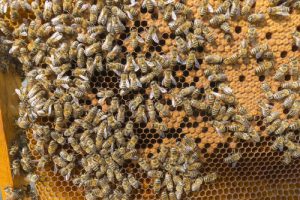Florida is home to a host of stinging insects. Most kinds of bees, wasps, and hornets are actually beneficial to the natural environment — helping to pollinate plants and flowers is just one of the many ways these bugs make a difference. However, these pests can be deadly to those who have severe allergies to stinging insect venom. Even for someone without an allergy, an attack by a swarm of stinging bugs can cause severe reactions.
If you come upon a large nest of bees, wasps, or hornets, use caution and call the professional stinging bee removal experts at Critter Control® of Orlando. Thanks to eco-friendly alternatives and treatments, we have the techniques to neutralize stinging insects without causing harm to anyone inside your home.
Bees and Wasps in Florida
Because of its warm climate and lush bounty of flowers and trees, Florida is a haven for stinging insects. These are some of the most common bees and wasps found around the state:
3 Common Types of Bees Found in Orlando, FL
- Honey bee– Brought to North America by European settlers, honey bees aren’t native to the United States. Unless they are protecting their hive from intruders, they usually aren’t aggressive either. In addition, honey bee stingers have barbs, so they can only sting once.
- Bumblebee– Bumblebee bodies are covered in soft hair. Like honey bees, bumblebees help pollinate plants by foraging for nectar and gathering pollen to feed their young. Unlike honey bees, however, bumblebees have no barbs on their stingers, so they can sting many times.
- Carpenter bee– There are more than 500 carpenter bee species, and they can be found worldwide. Carpenter bees get their name because they build nests by burrowing into dead wood, like the structural timbers of a house. Females can sting but rarely do unless provoked, and males cannot sting at all.
4 Common Types of Wasps Found in Orlando, FL
- Cicada killer wasps — Large and solitary, cicada killer wasps don’t often live in large hives. Despite their name, these wasps are very gentle and will not sting unless they are stepped on or handled aggressively.
- Hornets — Of all the stinging insects in Florida, hornets tend to inspire the most fear. Because they are venomous and aggressive, these bugs are the cause of countless deaths across the U.S. every year. These colony insects tend to live in large, paper-like nests that look like honeycombs. Furthermore, they can sting repeatedly because their stingers do not contain barbs.
- Mud daubers — Mud daubers are solitary wasps. Female mud daubers build nests from mud and tend to reserve their sting for prey.
- Yellowjackets — Yellowjackets are often confused with bees because they are similar in size and appearance. These insects are important because they feed on many pest insects, and they tend to build large nests in trees and shrubs around local homes. And while yellow jackets have stingers with barbs, they can still sting repeatedly.
The Dangers of Stinging Insects
While a single sting is normally only painful and irritating for a few days, it can be life-threatening to someone who is allergic. Even for somebody who has no bee allergy, an attack by a swarm of bees or other stinging insects can be highly dangerous — as these stings become poisonous in large quantities.
Bees and other stinging insects typically build their hives in areas with low human traffic: up in trees, on porches, underneath gutters, and even in crawlspaces below houses. If you find one or more on your property, contact the stinging insect and bee removal team at Critter Control® of Orlando. We can inspect your surroundings, identify the exact insect species, and create a plan to safely remove them.
Preventing a Bee or Wasp Sting
Having an active bug population is crucial for the health of plants and animals throughout the Orlando area. But even though bees are typically harmless as they buzz around pollinating plants and flowers, having too many on your property can be a serious problem. Bees don’t typically show aggression on their own, but they may sting and swarm if they feel their hive or queen is in danger. While it is impossible to guarantee that bees and wasps on your property won’t sting you, there are some precautions you can take to reduce the chances:
- Try to avoid mowing your lawn, weeding, or planting flowers when bees or wasps may be collecting nectar.
- Wear shoes while walking around your yard.
- Keep sweets like sugary drinks and fruit covered when you take them outside.
- If you have fruit trees in your yard, pick the fruit when it ripens and remove any rotten or fallen produce.
- Here are 7 DIY tips to help deter wasps from your home.
The best way to prevent a sting is to have bees, wasps, and their hives or nests professionally removed from your property. To make sure stinging insects won’t stir up any more trouble around your home, the licensed professionals at Critter Control® of Orlando will safely remove and relocate them to a secluded, safe area.
Wasp and Bee Removal You Can Count On
Because these bugs are potentially dangerous to your health and essential for your environment, bees and other stinging insects should always be removed by professionals. The licensed technicians at Critter Control® of Orlando will remove bee populations from your property.





